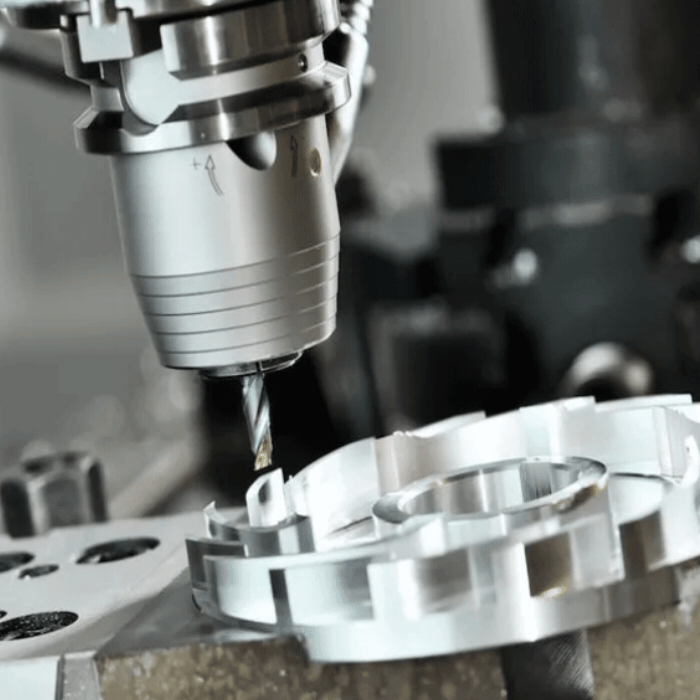Common Failure Modes and Causes of Machine Parts

The failure of machine parts refers to the partial or complete loss of the design function of the part during the use of the part. The parts are completely destroyed and cannot continue to work, or the parts have been severely damaged, if they continue to work, they will lose their safety; or although they can work safely but have lost the design accuracy, etc., all phenomena are considered failures.
In order to prevent component failure, the following failure analysis should be performed on the component, namely, by judging the failure form of the component, determining the failure mechanism and cause of the component, selecting the material in a targeted manner, determining a reasonable processing route, and proposing measures to prevent failure.
The failure mode of machine parts
The common failure modes of machine parts can be divided into three types: excessive deformation failure, fracture failure, and surface damage failure.
(1) Excessive deformation failure
Part failure is caused by excessive deformation exceeding the allowable range. It mainly includes failure forms such as excessive elastic deformation, plastic deformation, and creep occurring at high temperatures.
(2) Fracture failure
A phenomenon in which parts are separated into two or more unconnected parts due to excessive load or fatigue damage. Fracture is the most serious form of failure. It includes ductile fracture failure, low-temperature brittle fracture failure, fatigue fracture failure, creep fracture failure, and environmental fracture failure.
(3) Surface damage failure
When the parts are working, due to the relative friction of the surface or the corrosion of the environmental medium, the surface of the parts is damaged, or the size changes and causes the failure. It mainly includes the forms of surface wear failure, corrosion failure, and surface fatigue failure.
It needs to be pointed out that the same machine parts often work in more than one failure mode. However, generally, one method always plays a leading role when the parts fail. The core problem of failure analysis is to find out the main failure modes.
Causes of failure of machine parts
There are many factors that cause the failure of machine parts and are relatively complex, involving the structural design of the parts, material selection, material processing and manufacturing, product assembly, and maintenance.
(1) Unreasonable design
This mainly refers to the incorrect or unreasonable structure and shape of parts, such as gaps in parts, small arc corners, transition areas of different shapes, etc. On the other hand, it refers to the underestimation of the working conditions and overload conditions of the parts, resulting in insufficient actual working capacity of the parts, resulting in early failure of the parts.
(2) Unreasonable selection of materials
In the design, the failure mode of the part was wrongly judged, and the selected material performance could not meet the requirements of the working conditions; the performance index based on the material selection did not reflect the resistance of the material to the actual failure mode, and the wrong material was selected; the quality of the selected material was too poor, Unqualified composition or performance leading to failure to meet the design requirements, etc. are all unreasonable materials selection.
(3) Unreasonable processing technology
Improper processing technology of parts may cause various defects, leading to early failure of parts during use. For example, overheating, overburning, and band-like structures occurred during hot working; decarburization, deformation, and cracking occurred during heat treatment; deep knife marks and grinding cracks occurred during cold working.
(4) Improper installation and use
The assembly and installation process does not meet the technical requirements, such as too tight, too loose, inaccurate alignment, unstable fixing, etc., may cause the parts to fail to work or prematurely fail; in addition, illegal operation and overload during use, over speed, failure to repair and maintain on-time, etc. can also cause premature failure of parts.
As an expert who has studied machine parts for many years, ZHONGKEN can provide you with professional advice to a certain extent. If you want to know more information after reading the above, you can get a comprehensive solution by contacting us.
As an experienced parts supplier, ZHONGKEN always prioritizes the needs of customers and can provide users with quality-guaranteed products. We are equipped with a professional quality inspection system and a comprehensive management team, which can fully control the quality and details of the products. At the same time, our thoughtful one-stop service has also gained praise and trust from many customers. If you are interested in our machine parts, please contact us immediately!


